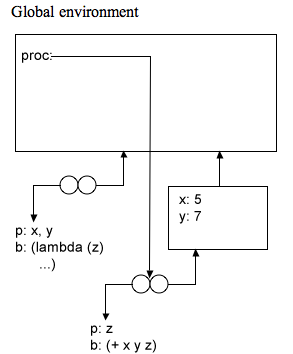
AP CS Programming Test #3
0. (0 points) NAME________________________________________ PERIOD_________
INSTRUCTIONS
1. (5 points; 1 point per line of code) Suppose that the following five lines of Scheme code are executed. Draw the box-and-pointer diagram that results for each line of code.
(Draw one diagram for all five lines.)
(define a '(1 (2 3) 4)) (define b (cons a (cdr a))) (define c (list a b)) (set-cdr! (cadr b) 5) (set-car! (cddar c) 6)

(1/2 point bonus) What is the output of (cadr a)?
(2 . 5)
2. (3 points) Write Scheme code that will produce the following environment diagram:

Note that proc is a procedure that takes one input, z, but that procedure must be inside a let (the unnamed procedure on the left and the corresponding frame that gets created when it is called immediately). So we get:
(define proc
(let ((x 5)
(y 7))
(lambda (z) (+ x y z))))
3. (8 points) Exercise 3.22 from the book.
Instead of representing a queue as a pair of pointers, we can build a queue as a procedure with local state. The local state will consist of pointers to the beginning and the end of an ordinary list. Thus, the make-queue procedure will have the form
(define (make-queue)
(let ((front-ptr ...)
(rear-ptr ...))
<definitions of internal procedures>
(define (dispatch m) ...)
dispatch))
Complete the definition of make-queue and provide implementations of the queue operations using this representation by filling in the blanks.
(define (make-queue)
(let ((front-ptr '())
(rear-ptr '()))
(define (empty?)
(null? front-ptr)) ; Can actually ignore rear-ptr; need to set rear-ptr to '() in
; delete! if we want to include it here.
(define (insert! datum)
(let ((new-pair (cons datum '()))) ; For some reason, some people never used new-pair
(cond ((empty?) (set! front-ptr new-pair)
(set! rear-ptr new-pair))
(else (set-cdr! rear-ptr new-pair)
(set! rear-ptr new-pair)))))
(define (delete!) ; Must return the first element of the queue in addition
; to deleting it from the queue
(cond ((empty?) (error "Nothing in queue to delete!"))
(else (let ((datum (car front-ptr))) ; could also use (peek)
(set! front-ptr (cdr front-ptr))
datum))))
(define (peek)
(cond ((empty?) (error "Nothing in queue to return!"))
(else (car front-ptr))))
(define (dispatch m)
(cond ((eq? m 'insert!) insert!)
((eq? m 'delete!) delete!)
((eq? m 'peek) peek)))
dispatch))
4. (4 points, 1/2 point per blank) Consider the following code:
(define (make-thing)
(let ((a 0)
(b 1))
(define (next)
(let ((return b)
(c (+ a b)))
(set! a b)
(set! b c)
return))
(lambda (msg)
(cond ((eq? msg 'next) next)
(else (error "?"))))))
(1/2 point per blank) In each blank, fill in what will be returned for that line of code. (The code sequence matters.)
> (define x (make-thing)) > (x 'next) #<procedure> > ((x 'next)) 1 > ((x 'next)) 1 > ((x 'next)) 2 > ((x 'next)) 3 > ((x 'next)) 5 > ((x 'next)) 8
In English, what would a good name for make-thing be? make-fibonacci